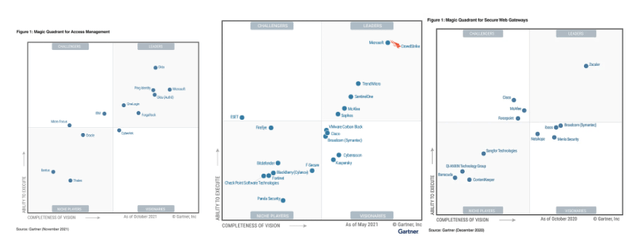
Peach_iStock
Thesis
Okta (NASDAQ:NASDAQ:OKTA) is a leader in the lucrative cybersecurity industry, but multiple execution issues have plagued the company lately. At this point, Okta is a risky bet that will only pay off if management can improve the company’s quality.
Introduction
I’ve been an Okta bull for a long time. I named it one of my top 10 stock picks for 2022 and also recommended the stock to members of Tech Investing Edge, my private investing community. It’s been a tough ride, with the stock down 71% year to date, although it’s somewhat consoling that my other top cybersecurity pick CrowdStrike (CRWD) is handily outperforming the S&P 500 year to date.
In this article, I revise my Okta thesis to hold due to a very high uncertainty rating on the stock. I think that Okta has the most upside, but also the most downside, of top cybersecurity companies. If Okta can improve its execution, then it’s one of the most undervalued stocks in the market today. But if not, then there is no path to profitability or future alpha generation.
Cybersecurity Leaders Comparison
Let’s first take a look at the differences between Okta and its peers to better understand what I mean by execution and quality issues.
Financials
| Ticker | TTM Revenue | Rev. Growth | Rule of 40 | Gross Margin | R&D | S&M | P/S |
| OKTA | 1.5B | 43% | -12 | 72% | 36% | 61% | 6 |
| CRWD | 1.6B | 61% | 51 | 74% | 26% | 42% | 23 |
| ZS | 1.0B | 63% | 35 | 77% | 27% | 67% | 21 |
Source: Financial Statements
Comparing the three cloud cybersecurity leaders, it’s clear why Okta is the ugly duckling. It has slower revenue growth and a terrible Rule of 40 score and thus deserves a lower multiple. No argument from me there. The key question is how much lower does Okta’s multiple have to be for it to be an interesting investment.
Structurally, there’s no reason why Okta can’t eventually become as high quality as CrowdStrike or Zscaler (ZS). All of Okta, CrowdStrike, and Zscaler have gross margins within the 72-77% range. Like its peers, Okta is an asset-light software business whose main expense is its employees. The main difference is that Okta has much higher R&D and S&M expenses compared to peers. Relative to CrowdStrike, Okta loses 29 points on the Rule of 40 due to these expenses.
While Okta is probably multiple quarters from a turnaround – if one even comes – the good news is that it’s not in immediate danger of bankruptcy. Their nearly $2.5B in cash and short term investments should fund their losses for at least a few more years even if they fail to improve when it comes to profitability. So, investors do have time to wait for a turnaround if they choose to stick with Okta.
Competition
A key question for the Okta thesis is whether these operating expenses can and will come down, without an adverse impact on revenue growth. Considering that gross margins aren’t the issue, the other main consideration is whether Okta faces too much competition and thus needs to have these high operating expenses to fund its growth.

Gartner
As shown, Okta, CrowdStrike, and Zscaler are all leaders in their respective magic quadrants, with Microsoft being the only competitor listed ahead of Okta and CrowdStrike, and nobody ahead of Zscaler. In fact, the landscape for identity and access management looks much less crowded relative to CrowdStrike’s endpoint protection platform sub-industry; Okta actually shows up in the leaders corner of its magic quadrant twice thanks to its acquisition of Auth0.
Personally, I use Okta every day in my day job and it works very well. Instant login into all my work apps saves a lot of time and is more secure than alternatives. In my experience, Okta is a quiet and reliable service; it’s never gone offline or prevented me from getting my work done. The same can’t be said for alternatives I’ve used, even an in-house one developed by a much larger company.
I’d actually argue that in theory, Okta has a wider moat than other cybersecurity leaders. If I want to make a new endpoint protection platform, I just build it and can sell almost immediately to customers. On the other hand, if I want to build an identity management platform, I first have to convince thousands of leading software products to integrate with me, and only then will any customers be interested in buying my product. Sure, other areas of cybersecurity benefit from network effects, but I believe that they’re strongest in identity management.
Thus, as far as I can tell, competition is no more of an issue for Okta than it is for its peers. That’s another data point that supports Okta eventually getting on track.
Valuation
A key component of valuation is profitability. If Okta isn’t spending excessively to fend off competition, then why is it so much less profitable than its peers? Well, I’m scratching my head about this one as well, and a key part of my thesis is that these expenses eventually come down. Fortunately, this quarter Okta’s expenses did come in lower than expected due to slowing headcount growth and strong-than-expected revenue growth.
The other key component is growth. While Okta’s growth is lower than that of CrowdStrike and Zscaler, I expect the gap to narrow going forward as I don’t think >60% growth is sustainable for Okta’s peers in the long term. Meanwhile, there are signs that Okta’s growth could be sustained above 30% for a while. That’s what management guided to prior to this quarter. The current growth of 43% was supported by 26% growth in customer count and 35% growth in large customer count. Alongside a 122% dollar-based net retention rate, this level of growth sets Okta up well for years of strong top line performance.
What does that mean for Okta’s valuation? In the model I shared with Tech Investing Edge members, if Okta can sustain 28% revenue growth and eventually reach 15% profit margin, I believe that its fair value is $133. This is much lower than my fair value estimate at the start of the year, but still more than double its current price of $65. On the other hand, I believe that CrowdStrike and Zscaler are near their fair value today. That makes Okta the highest upside option, assuming they can deliver on my growth and profitability targets.
Understanding The Reaction
Okta stock sold off more than 35% after earnings. At first glance, there wasn’t much cause for concern, as Okta posted a 5% revenue beat and 67% EPS beat, continuing a long streak of top and bottom line beats. They also slightly raised full year top and bottom line guidance.
Based on these numbers, management probably could have spun these results as solid and within expectations. Instead, CEO Todd McKinnon opened the call with a mixed message:
While the identity market opportunity remains healthy, our Q2 financial results were mixed. We produced better than expected profitability, but our top line metrics were not where we wanted them to be due to challenges related to the integration of the Auth0 and Okta sales organizations, as well as modest macro headwinds.
Despite the mixed messaging, management once again reiterated the security incident earlier in the year hasn’t had a material impact on Okta’s business; that incident contributed heavily to Okta stock’s recent slide nevertheless. They also said that macro issues are showing up a bit, but they don’t appear to be as big of an issue for Okta as they are for less defensive companies.
The main issue that management focused on was the Auth0 acquisition, which happened last year. In particular, they highlighted customer confusion and increased attrition as a result of the acquisition, which CEO Todd McKinnon took responsibility for. As one example, their sales team didn’t know which of the combined company’s two SIEM products to sell. Okta has taken steps to address this by drawing clearer boundaries between the products.
Due to the impact of these issues, management noted that:
We are lowering our calculated billings outlook for the year by approximately $140 million due to the outlook headwinds outlined earlier. We now expect calculated billings for FY ’23 to be approximately $2.04 billion to $2.05 billion, representing growth of 27% when viewed on a like-for-like basis or 19% on an as-reported basis. Given our near-term outlook coupled with the uncertainties of the evolving macro environment we are reevaluating our FY ’26 targets at this time.
Following their report, analysts on the call were very hard on management, questioning whether the Okta platform was secure in light of recent hacks and questioning whether Okta was shifting its strategy too much from what was originally announced after the Auth0 acquisition.
Okta’s lowered billings outlook throws into question whether its long-term guidance for sustained growth above 30% is still attainable. Okta acknowledged this and is planning to update that guidance next quarter. That leaves three months where we’re left in the dark about Okta’s long-term plan, and we all know that markets hate uncertainty.
It’s very possible that Okta comes back next quarter with only slightly revised guidance of, say, 25% or higher sustained growth, and that the stock rebounds strongly once that clarity about the long-term model is available again. Based on my price target, Okta has some room to lower its growth forecast and still be undervalued today.
However, it’s also possible that things are worse than they seem, perhaps due to the recent security incidents involving Okta, and that management is simply dragging their feet on announcing much worse guidance. Only time will tell.
Conclusion
Okta has a great product in a lucrative industry, but the business metrics haven’t looked as good. This is due to a combination of factors including management’s preference for aggressive spending on operating expenses, issues with the recent Auth0 acquisition, macro issues, and perhaps the recent breaches attributed to Okta.
If management can get things back on track, then Okta’s cheap valuation of 6 P/S gives it a lot of upside; much more than what’s available from fully valued peers. However, if things don’t get better after this year, then investors might regret buying a fair company at a great price, instead of a great company at a fair price. Personally, I prefer to own great cybersecurity companies, and I don’t think Okta is one of them at this point.


Be the first to comment